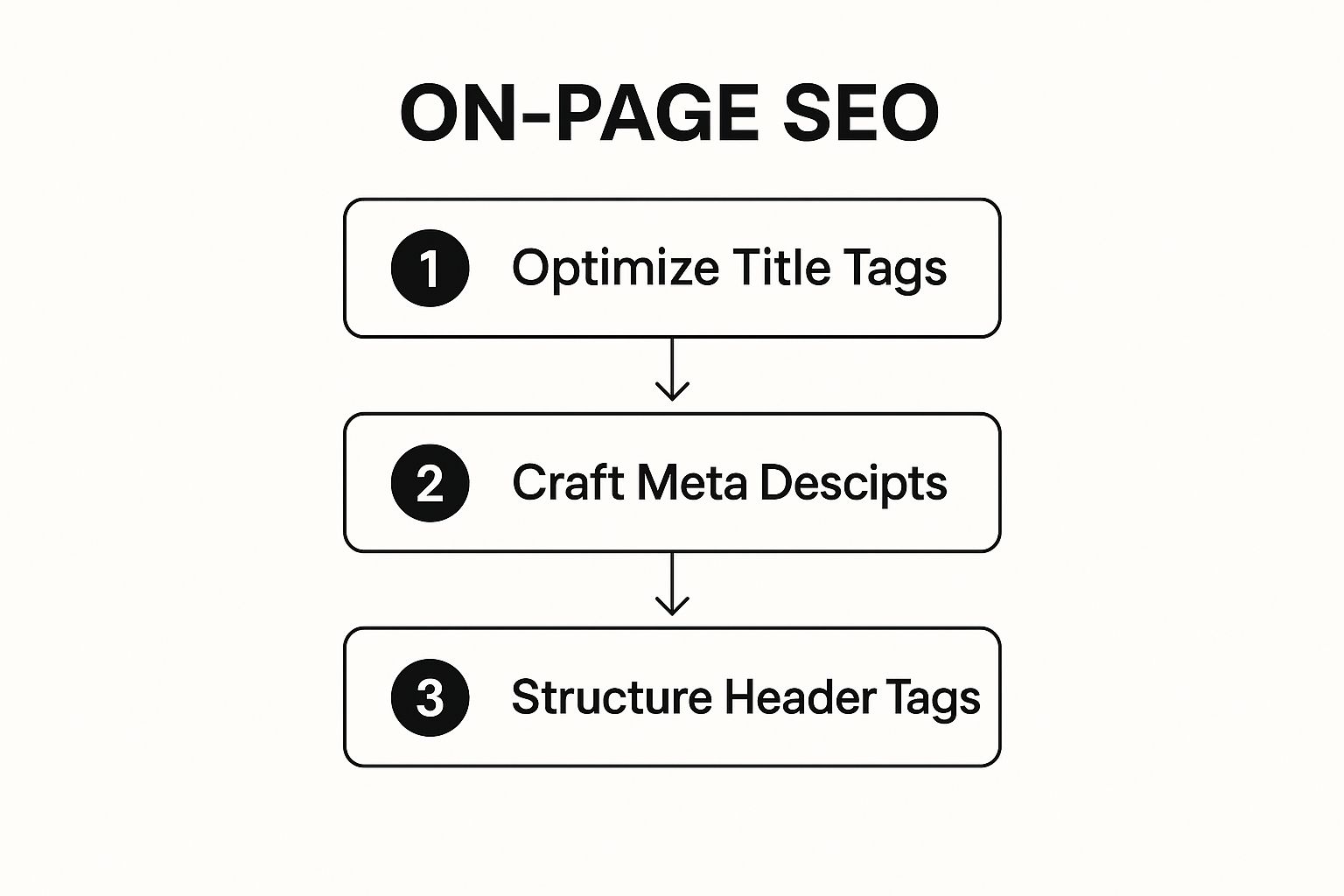SEO for accountants is all about fine-tuning your firm's website so it shows up higher in search engines like Google. When done right, it puts you directly in front of potential clients who are actively looking for tax, bookkeeping, or advisory services. It’s a seriously powerful way to generate a consistent flow of leads.
Why Your Firm's Future Depends on SEO
In Australia's packed accounting market, just relying on word-of-mouth isn't going to cut it for growth anymore. Your firm's future is now directly tied to how visible you are online, which is where the vast majority of clients start their search for a new accountant. A smart Search Engine Optimisation (SEO) plan is the critical bridge between your expertise and the clients who desperately need it.
If you're just getting started, it's worth reading a complete guide to Search Engine Optimization to get your head around the core concepts that drive modern client acquisition.
Meeting Clients Where They Search
Think about the real-world moments that push someone to find an accountant. A small business owner in Brisbane is stressing about their BAS lodgement. A freelancer needs tax advice for their specific industry. Someone else is wrestling with a complex tax return for their investment property.
What’s the first thing they do? They grab their phone and type a question into Google.
They're searching for things like:
- "small business accountant Brisbane"
- "tax help for tradies near me"
- "best accountant for investment properties"
If your firm isn't on the first page of those results, you're completely invisible to these high-intent prospects. SEO is the mechanism that gets you found first.
But what are these potential clients really thinking when they search? Understanding their intent is key to creating content that connects with them.
Decoding Client Search Intent
This table breaks down the types of keywords clients use, revealing their specific needs and helping you tailor your website and content to attract them at the right moment.
| Keyword Type | What the Client is Thinking | Example Search Query |
|---|---|---|
| Informational | "I have a tax problem or question and need information." | "how to calculate capital gains tax on property" |
| Navigational | "I know of a specific firm or the ATO and want to find their website." | "ATO tax tables" or "[Your Firm Name]" |
| Commercial | "I'm comparing accountants and need to find the best one for my situation." | "best accountant for startups" or "Xero vs MYOB accountant" |
| Transactional | "I need an accountant now and I'm ready to make contact." | "accountant near me" or "book a tax return appointment" |
Knowing these differences helps you create specific pages and blog posts that answer their exact questions, positioning your firm as the obvious solution when they're ready to act.
Moving Beyond Referrals for Sustainable Growth
Referrals are great, but they’re unpredictable and you can't really scale them. A solid SEO strategy, on the other hand, delivers a consistent and reliable stream of leads, putting you in the driver's seat of your firm's growth. It turns your website from a static online brochure into a tireless lead-generation machine that works for you 24/7.
A journalist on Reddit asked business owners how they find new professional services. The top-voted comment was simple: "I Google it. Every single time. If an accountant isn't showing up for what I need, they don't exist to me." That's the brutal reality of the market today.
And the competition is intense. The accounting sector in Australia is incredibly crowded, with around 276,500 accountants all competing for attention. This saturation makes standing out absolutely essential. The data tells a clear story: the first organic result on Google gets an average click-through rate of 31.7%, and the top three results combined pull in 61.8% of all clicks. Being on page one isn’t just a nice-to-have; it’s a necessity for survival and growth. You can find more insights on the competitive advantage SEO offers on Paperstack.com.au.
By investing in SEO for accountants, you aren't just chasing keywords. You're building a sustainable pipeline of your ideal clients, establishing your firm as an authority in the field, and future-proofing your business. It's about meeting clients at the exact moment of their need and showing them you’re the best choice before they’ve even thought about calling a competitor.
Building a Website That Google Trusts
Before a single keyword can bring you a client, your website needs to earn Google's trust. Think of it as your digital front door; if it’s slow, confusing, or looks broken on a phone, potential clients—and search engines—will simply walk away.
Getting the technical foundation right isn't just a suggestion. It's the essential pre-flight check for any successful SEO strategy for accountants. This all comes down to three things: speed, security, and structure. Nail these, and your site will be ready to start climbing the search rankings.
Your Website's Need for Speed
Website loading speed is a massive factor in how Google judges your site's quality. A slow website is frustrating, and frustrated users leave. That sends a pretty clear negative signal to Google.
Just how big is the impact? Pages that load within two seconds have an average bounce rate of just 9%. But wait five seconds for a page to load, and that rate skyrockets to 38%.
One of the most critical elements for both user satisfaction and Google rankings is website speed; learn how to improve website loading speed to enhance your site's performance.
You don't need to be a developer to get a quick diagnosis. Google’s own PageSpeed Insights is a free tool that gives you a straightforward report on your site's performance on both mobile and desktop.

It gives you a score out of 100 and, more importantly, a list of specific things you can fix, like optimising images or getting rid of unused code.
Secure and Mobile-Ready Are Non-Negotiable
Beyond sheer speed, two technical elements are now absolute table stakes for any professional website. These are not optional if you want to be taken seriously.
-
HTTPS Security: Your website URL needs to start with
https://, nothttp://. That 'S' means the connection is secure, encrypting any data shared between a visitor's browser and your site. Google has confirmed this is a ranking signal for years, and most browsers now actively warn users when a site isn't secure. -
Mobile-Friendliness: With over 60% of all searches now happening on mobile devices, Google unapologetically prioritises sites that work flawlessly on a small screen. If visitors have to pinch and zoom to read your content, your site is considered outdated and will struggle to rank. Your design must be responsive, adapting automatically to any screen size.
A journalist once asked me for the single biggest "quick win" in SEO for a local business. I told them to check their website on their phone. If it's not fast and easy to use, nothing else they do matters. It's the digital equivalent of a broken front door.
Structuring Your Site for Clarity and Conversions
A logical website structure does two things at once: it helps users find what they need, and it helps search engines understand what your firm does. This is where so many firms go wrong, lumping all their expertise under a generic "Services" page.
Don't do that. Instead, create a dedicated page for each core service you offer. This clarity is absolutely crucial for effective SEO for accounting firms.
A well-organised site map might look something like this:
- Home: Your main welcome mat.
- About Us: Your firm's story and team profiles.
- Services (Main Menu Item):
- Small Business Tax Advisory
- BAS Lodgement Services
- Self-Managed Super Fund (SMSF) Audits
- Xero and MYOB Bookkeeping
- Blog: Where you publish your expert articles.
- Contact Us: Clear contact details and a simple enquiry form.
This kind of structure lets you target specific, high-intent keywords on each service page. Suddenly, you have a much better chance of ranking for searches like "SMSF audit services Brisbane." It also gives a potential client a clear path from discovering your expertise to making an enquiry.
This organised approach is the final piece in building a website that both Google, and your future clients, will trust.
Winning the Local Search Battle in Your Suburb
For most accounting firms, the best clients are the ones right around the corner. While ranking nationally is a nice thought, the real, tangible growth comes from dominating your local area. This is where a focused local SEO strategy turns your firm into the obvious choice for anyone in your community searching for financial expertise.
It all starts with your most powerful local marketing tool: your Google Business Profile (GBP). Think of it as your digital shopfront on Google's turf. A huge 46% of all Google searches are for local information, which makes a well-optimised GBP non-negotiable for pulling in nearby clients.
Optimise Your Google Business Profile
Your GBP is often the very first interaction a potential client has with your firm online. It’s what pops up in the "Map Pack" results and gives searchers a quick snapshot of your services, reputation, and where you're located. Getting this right is critical.
A complete and accurate profile doesn't just help clients; it sends strong trust signals straight to Google.
This screenshot shows the interface you'll use to manage your firm's local presence. It’s pretty powerful.

This dashboard is your command centre for updating business hours, adding photos, responding to reviews, and showing off what makes your firm unique.
To turn your profile into a client magnet, focus on these key areas:
- Select Precise Categories: Don't just list "Accountant." Get specific. Use primary and secondary categories like "Tax Consultant," "Bookkeeping Service," and "Chartered Accountant." This helps Google match you to much more specific searches.
- Showcase Your Office: Upload high-quality, professional photos of your office exterior, interior, and your team. This builds instant trust and gives potential clients a feel for your firm's personality before they even pick up the phone.
- Develop a Review System: Positive reviews are one of the heaviest-hitting local ranking factors. You need a simple, repeatable process to ask satisfied clients for a review. Honestly, even a simple follow-up email with a direct link can make a massive difference.
Build Local Trust with Citations and NAP Consistency
Beyond your GBP, Google scours the web for mentions of your firm to verify that you are who and where you say you are. These mentions are called citations, which are just listings of your firm's Name, Address, and Phone number (NAP) on other websites.
Consistency here is absolutely crucial. A tiny discrepancy, like using "St" on one directory and "Street" on another, can confuse search engines and water down your local authority. Your NAP details have to be identical everywhere they appear.
Start by getting your firm listed on major Australian business directories:
In a Reddit thread asking for weird but effective business tips, a user swore by this: "Once a year, I spend an hour Googling my own business NAP and checking every single directory. If one listing has a typo, it's like having a wrong number in the phone book. It kills trust, both with customers and with Google."
This consistent digital footprint reinforces your connection to a specific geographic area, making you a much more relevant result for those "near me" searches.
Target Specific Suburbs with Dedicated Pages
Finally, to truly own your service area, you need to show Google you're the go-to expert for each suburb you serve. The best way to do this is by creating specific "location pages" on your website.
Instead of one generic service page, create hyper-local versions. For instance, if you're a Brisbane firm, you could build out pages like:
yourwebsite.com.au/accountant-new-farmyourwebsite.com.au/tax-services-paddingtonyourwebsite.com.au/bookkeeping-fortitude-valley
Each of these pages should have unique content that's actually relevant to that suburb. Mention local landmarks, discuss financial challenges specific to businesses in that area, and pop in a testimonial from a client who lives or works there. This level of detail screams local relevance, making it much more likely you'll rank when someone in New Farm searches for an "accountant near me."
This targeted approach transforms your website from a general resource into a collection of highly relevant local hubs, a core tactic in the playbook of SEO for accountants looking to win the local search game.
Creating Content That Attracts Your Ideal Client

This is where the real work begins. A technically sound website gets you in the game, but a sharp content strategy is how you win it. It’s time to shift from being just an accountant to becoming a trusted, visible advisor online.
We need to move beyond simple service descriptions and start publishing content that genuinely solves problems for your ideal clients.
Good content shows off your expertise long before a prospect even thinks about picking up the phone. It builds trust, establishes authority, and answers the burning questions that keep business owners up at night. This is what separates firms that thrive online from those that just exist.
From Accountant-Speak to Client Solutions
The single biggest mistake I see accountants make with their content is writing for other accountants. Your potential clients don't care about the finer points of subsection 24B of the Tax Act; they care about what it means for their business's bottom line.
Your goal is to translate your complex knowledge into simple, actionable advice.
Think about your audience: tradies, cafe owners, consultants, and startup founders. They need clarity, not jargon. Write in plain English. This approach makes your firm relatable and shows you actually understand their world and their challenges.
For example, instead of a headline like "An Analysis of Depreciation Methods for Capital Assets," try something direct: "Tax Tips for Tradies: How to Claim Your New Ute and Tools." See the difference? The second option speaks directly to a specific client about a specific need, using their language.
Brainstorming Content That Actually Gets Read
Your best content ideas will come straight from your clients' most frequent questions. Just think about the conversations you have every single day. What are the recurring worries and common themes?
Start a simple list of the questions you get asked over and over.
- "What's the best way to structure my new business?"
- "Can I actually claim my home office expenses?"
- "How do I pay myself when I'm a sole trader?"
Every single one of these is a potential blog post that can attract dozens of new clients who are typing those exact questions into Google. This is how you position yourself as the expert with the solutions they’re desperately looking for.
The secret to great SEO content for accountants is to stop writing about accounting and start writing about your clients' problems. Your blog shouldn't be a technical journal; it should be the most helpful FAQ a small business owner has ever read.
This approach delivers incredible value, and the numbers back it up. Organic search is a massive channel for client acquisition in Australia. In fact, 57% of B2B marketers see SEO as delivering their highest ROI. Better yet, leads from SEO have a 14.6% close rate—way higher than most old-school marketing tactics.
This proves that creating genuinely helpful content directly fuels client growth. You can dig into more SEO insights like these over at Supple.com.au.
Creating a Simple Content Calendar
Consistency is everything. A simple quarterly plan helps you stay on track and publish content that aligns with what your clients are thinking about at different times of the year. Here's a basic framework to get you started.
Example Quarterly Content Calendar
| Quarter | Core Theme | Blog Post Idea 1 | Blog Post Idea 2 |
|---|---|---|---|
| Q1 (Jan-Mar) | New Year & Tax Prep | 5 Financial Resolutions for Your Small Business in 2024 | Your EOFY Checklist: How to Prepare Now to Avoid Stress Later |
| Q2 (Apr-Jun) | EOFY & Deductions | Last-Minute Tax Deductions You Might Be Missing | A Small Business Owner's Guide to Lodging Your BAS |
| Q3 (Jul-Sep) | Business Growth | Should You Register for GST? A Simple Guide | 3 Ways to Improve Your Business Cash Flow This Spring |
| Q4 (Oct-Dec) | Holiday & Year-End | Navigating Christmas Bonuses and Staff Gifts | How to Set Your Business Up for Success in the New Year |
This isn't about creating a rigid, unbreakable schedule. It's about having a plan that gives your content direction and ensures you're always addressing relevant client needs.
Structuring Service Pages That Convert
Think of your service pages as your digital sales pitches. They need to do more than just list what you offer; they must hit on client pain points and clearly position your firm as the solution.
Instead of a generic "Tax Services" page, frame it around the client's problem.
A Weak Structure:
- Tax Returns
- BAS Lodgement
- Tax Planning
A Strong, Client-Focused Structure:
- Stress-Free Tax Returns: We handle the complexity so you can focus on your business.
- Never Miss a BAS Deadline Again: Reliable, accurate lodgement to avoid ATO penalties.
- Proactive Tax Planning to Maximise Your Profits: We find savings you didn't know existed.
This subtle shift in language makes a world of difference. It shows you understand their anxieties and frames your service as the direct remedy. This method is a core principle of effective SEO for accountants, and it turns a passive page into a compelling reason why your firm is the only choice.
Earning Links and Building Digital Authority
Think of a high-quality link from another website as a trusted referral, but in the digital world. When a reputable site links to your firm, it’s a massive vote of confidence in Google’s eyes. It tells the search engine that you’re a credible, authoritative source of information. This process, called link building, is a cornerstone of any serious SEO for accountants strategy.
The goal here isn't just collecting any old link. It's about earning them from relevant, respected sources. Doing this builds your firm's digital authority over time, which makes it much easier to rank for those competitive, money-making keywords. A strong link profile is often what separates the firms that consistently pull in clients online from those that stay invisible.
Start with the Easy Win: Internal Links
Before you even worry about what other websites are doing, you can get a quick and powerful win with internal linking. This is just the simple act of linking from one page on your own website to another. It sounds almost too easy, but it’s incredibly effective.
For example, if you've written a blog post on "Tax Tips for Tradies," you absolutely should pop a link in that article that points straight to your "Small Business Tax Services" page.
This does two crucial things at once:
- It guides your visitors. You’re helping them move from a piece of useful information toward the exact service that can solve their problem.
- It helps Google. You're showing the search engine the structure of your site and signalling which pages are most important.
Internal links act like signposts, spreading authority around your website and showing how all your content connects. It's a foundational tactic you can start putting into practice today.
Safe and Effective Link Building Tactics
Alright, let's talk about earning those valuable external links, also known as backlinks. For accounting firms, the best path is to focus on strategies that match your professional standing and your involvement in the local community. Forget the aggressive, spammy tactics you might hear about. We're focused on genuine, authority-building actions.
One of the best ways to get powerful local links is through community engagement. Think about sponsoring a local junior sports team or a charity fun run. These organisations nearly always have a "sponsors" page on their website where they'll happily link back to your firm. These are high-quality, locally relevant links that Google loves.
A journalist on Reddit's /r/AskJournalists was asked for the most underrated PR tactic for local professionals. A top reply was eye-opening: "Sponsor everything. The local school fete, the U12s soccer team, a fundraiser. The goodwill is great, but the high-quality local backlinks you get from their websites are SEO gold."
Another fantastic strategy is to put yourself forward as an expert for journalists. Platforms like SourceBottle connect reporters with experts who can give commentary on finance topics. If you can provide a sharp, insightful quote for an article, you can earn a backlink from a major news outlet or industry publication. That kind of link carries immense authority.
Creating Resources People Want to Link To
The final piece of this puzzle is to create something on your website so valuable that other people actively want to link to it. This is usually a big piece of "pillar content"—a comprehensive guide, a handy calculator, or an original checklist that solves a major problem for your ideal client.
Imagine creating a definitive resource like:
- "The Ultimate Guide to Starting a Business in Queensland"
- "An Interactive Sole Trader vs. Company Tax Calculator"
- "A Downloadable EOFY Checklist for Small Businesses"
When you create something genuinely useful that’s better than what anyone else is offering, you’ll find that industry blogs, business associations, and even government resource pages will link to it as a helpful reference for their own audience. This is the pinnacle of link building. It doesn't just build your authority; it drives real referral traffic organically, establishing your firm not just as a service provider, but as a recognised authority in your field.
Got SEO Questions? Here Are Your Answers.

Stepping into search engine optimisation can feel like learning a new language. There are a lot of moving parts, and it’s natural to have questions before you dive in. It can definitely feel a bit intimidating at first.
Let's clear the air and tackle some of the most common queries we hear from accounting firms. We'll cover the practical realities of an SEO for accountants strategy—from timelines and budgets to figuring out what actually moves the needle for your firm's growth.
How Long Does SEO Take to Work for an Accounting Firm?
This is always the first question, and the honest answer is this: SEO is a long game. It's not an overnight fix. Think of it less like a sprint and more like building a solid, trusted reputation in your local community—it happens gradually through consistent, high-quality effort.
In a competitive market like accounting in Australia, you should expect to see the first signs of positive movement within three to six months. This might look like your website climbing from page five to page two for some of your key service keywords.
But the significant, lead-generating results you're really after—like landing on the first page for your most valuable services—that often takes a more dedicated six to 12 months of work. The upside is that these results are lasting digital assets that keep bringing in clients long after the initial push.
Should I Do SEO Myself or Hire an Agency?
The right call here really depends on your time, budget, and how comfortable you are getting your hands dirty with the technical side of marketing. There's no single "correct" answer, and firms find success down different paths.
You can absolutely handle some foundational SEO tasks in-house.
-
DIY SEO: Things like optimising your Google Business Profile, writing helpful blog posts that answer common client questions, and building out your local directory listings are all achievable. This is a fantastic starting point and can deliver genuine value.
-
Hiring an Agency: An expert agency brings the experience and tools to accelerate your results. They handle the complex, time-consuming jobs like technical site audits, strategic link building, and deep performance analysis. This frees you up to do what you do best—serve your clients.
-
A Hybrid Model: This is often the sweet spot. Your team manages the content—you're the experts, after all—by writing blog posts and service pages. Meanwhile, an SEO partner builds the technical framework and runs the authority-building campaigns behind the scenes.
A journalist on Reddit once asked a panel of digital marketers for their best advice for small professional services firms. The overwhelming consensus was: "Handle the content you're an expert in, but outsource the technical SEO. Your time is better spent being an accountant than trying to become a developer."
What Are the Most Important SEO Metrics to Track?
It’s incredibly easy to get lost in a sea of data. The key is to ignore the "vanity metrics" (like social media likes or total website visits with no context) and laser-focus on what directly impacts your firm's bottom line.
To get a true picture of your return on investment, you only need to track a handful of key performance indicators (KPIs).
Here are the four metrics that truly matter:
- Organic Traffic Growth: Is the number of people finding you through Google steadily increasing month-on-month? This is your top-level indicator that visibility is improving.
- Keyword Rankings: Are you showing up for your target commercial keywords? Tracking your position for terms like "tax accountant Melbourne" or "BAS lodgement services Sydney" shows if you're reaching the right audience.
- Google Business Profile Insights: Think of this as your local SEO report card. Pay close attention to how many phone calls, website clicks, and requests for directions your profile generates.
- Conversions: This is the big one. How many qualified leads—actual contact form submissions and client phone calls—are coming from your organic traffic? This number tells you if your SEO is actually making the phone ring.
By focusing on these four areas, you can cut through the noise and accurately measure the commercial impact of your SEO work.
Ready to turn your website into a client-generation engine? At The Brand Express, we specialise in data-driven SEO strategies that deliver real commercial results for accounting firms across Brisbane and Queensland. We partner with growth-focused businesses to increase search visibility and convert high-value leads. Discover how our performance-led approach can work for you at https://www.thebrandexpress.com.au.
